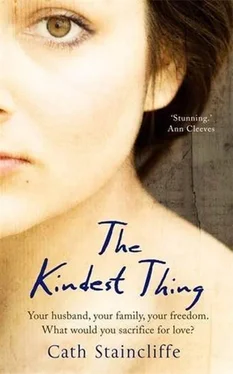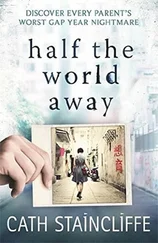It’s a lovely, generous speech, and the jury are captivated.
‘But Deborah could no longer manage. Her savage attack on her neighbour is testament to how disturbed she was becoming. W-w-weakened and terrified of what lay ahead, Deborah was unable to resist her husband any more. You have heard her say that she thought it might not happen even as she hoarded the drugs, that it might not happen even as she planned what to say if anyone grew suspicious, that it might not happen even as she poured Neil his last glass of wine. Her grasp on reality was loosening. Like a child who will hide behind his hands and imagine he can’t be seen.’ He dips his head for emphasis; the scrappy wool gives a little shiver, like a stiffened, shrunken lamb’s tail.
‘When Deborah gave Neil those doses of morphine, when she then suffocated him, it was because she was literally out of her mind. She could no longer tell right from wrong. She loved him and wanted to help him but she knew that by helping him she would be committing murder. The fear of what would happen added to her mental collapse.’
I hold myself tight, bound up, hands grasping each other, mouth rigid, frightened of flying apart, of unravelling before them.
‘Deborah Shelley was sick. She could no longer be held responsible for her actions. She acted while she was unfit to judge. Now you must judge her. The burden of proof is on the prosecution, which means that they must prove to you beyond all reasonable doubt that Deborah Shelley murdered her husband, fully aware of what she was doing. Ask yourselves: are you one hundred per cent certain that this was the case? One hundred per cent,’ he says again. ‘When she lay beside her husband on that early summer day, when she told him she loved him, was she fully aware of what she was doing? In the midst of the horrendous pressure she had been under, was she still completely responsible for her actions? If you have any doubts you must find Deborah not guilty of murder. Deborah Shelley was not flouting the law, she is not an advocate of mercy killing. She is a woman who, in the height of her sickness, got swept along by her dying husband’s pleas. She did wrong and has admitted it. All we ask now is that you bring your intelligence, your common sense and your humanity to consider the evidence. And find Deborah Shelley innocent of the charge of murder.’
The judge has the last word. He must interpret the law to the jury.
‘This has been a very sad case: a terminal illness, a life cut short, children left fatherless. But now you have one task ahead. That task is simple yet arduous. On the evidence you have heard, and only on that, you must judge whether Deborah Shelley was mentally responsible for her actions, whether or not the balance of her mind was disturbed on the fifteenth of June 2009 when she helped her husband die. If you find the evidence shows that she was of sound mind, then the verdict must be guilty of murder. If, however, you believe the balance of her mind was disturbed to such an extent that it diminished her responsibility then you must find the defendant not guilty of murder but guilty of manslaughter due to diminished responsibility.
‘You have heard experts give opposing views of Ms Shelley’s state of mind. This court now entrusts you with the duty of considering all the evidence and deciding who to believe. And I must remind you that if there is any doubt in your minds then you must find her not guilty of murder. Thank you.’
There is no knowing how long they will take. The hours drip by as I sit in the court cell but I would stop time. Because when they call me again my fate will be sealed.
Neil is with me now, his long legs stretched out, crossed at the ankles, his black hair tangled. He is reading. He looks up when he feels my eyes upon him and his own green eyes meet my gaze. They are merry and mischievous. He sets his book down, his movements fluid, and reaches over, cups his hand around the back of my neck.
‘Deborah.’ Three syllables savoured.
He bends to kiss me. His lips are smooth and warm, his tongue gentle, and I kiss him back, soft at first then harder.
We are floating, a long way from the shore. The water is balmy. I can taste the salt and smell the brine on the warm breath of the wind.
We swim on together; we will always be together. The sun is high. It glances off the water, fracturing into a million diamonds.
Neil holds my hand, palm to palm, his slim fingers entwined with mine.
Deborah.
Three syllables.
They call me back.
The jury have their verdict.
My jaw is rigid, my guts churning, my ears buzzing as I enter the dock. My breath is erratic and I’m aware that people can hear the stutter of it and see me fight to control my facial muscles, my movements spastic. I am so cold. I think my teeth must shatter, my skin harden and crack.
I want to be strong, for Adam, for Sophie and Jane, but it is beyond me.
They have chosen PA as the forewoman. I am surprised: she seems so young, with her neat ponytail and her tidy clothes. Is she a teacher, has she demonstrated some sort of leadership that influenced them to pick her? She’s shown little emotion during the trial – I’ve had no sense of empathy from her.
‘Have you reached a verdict?’the court clerk asks her.
‘Yes, we have.’
‘Is that a verdict upon which you are all agreed?’
‘Yes.’
‘On the charge of murder how do you find the defendant? Guilty or not guilty?’
I cannot hear, the buzzing in my head swells, I gulp to try and clear my ears. Dizziness spins me round, bubbles in my blood. I am choking.
I see Adam leap to his feet, and Jane. Sophie blanches, clutching at Veronica, who falls forward a little as though someone has punctured her, and Michael’s hand sweeps his face but his expression is relief, I think, not dismay.
Paralysed, petrified, I watch these motions, unable to translate. Sound is muted, stretched. I am very far away, shrinking, disappearing.
Then I catch the words. ‘Not guilty.’
Tears spill down my face and I gasp and cry out, a great howl of release.
There’s a pause and people sit again. I am huffing and puffing, the handkerchief that I’ve used already a wet ball.
‘And on the charge of manslaughter on the grounds of diminished responsibility, how do you find the defendant, guilty or not guilty?’
‘Guilty.’
The judge thanks the jury for their service. Hilda and Flo look pleased with themselves. Dolly is crying and the Prof puffs out his cheeks and messes with his glasses.
Ms Gleason’s eyes are shining and she is beaming at me.
Someone at the side, a reporter I think, dashes out. I will be on the teatime news.
In Styal, Prison Officer Clarkson is in the house office. She asks me how I’ve got on, and congratulates me on the verdict. I am drained, punch-drunk with relief. Upstairs is quiet. The shower is empty, still steamy from the last occupant. I stand under the jets and savour the warm spray on my eyelids and lips, turn and let it pour through my hair, drumming on my shoulders and down my spine. Sluicing away the grit and grime and sweat of the long day.
I put on my pyjamas and dressing-gown, go to get a cup of tea.
The women from my house are crowded into the kitchen. They let out a cheer when I come in.
‘We made you a cake,’ says Patsy.
They’re nudging each other and grinning, banter slipping back and forth. On the table is a glistening chocolate cake. I can’t speak.
‘Put the kettle on,’ someone yells, ‘she’s gasping. Aren’t yer, Mercy?’
I smile and nod, then sit at the table while mugs of tea are made and the cake carefully divided.
‘Did yer faint?’ Patsy asks. ‘I got a not guilty time before last, nearly keeled over.’
Читать дальше












